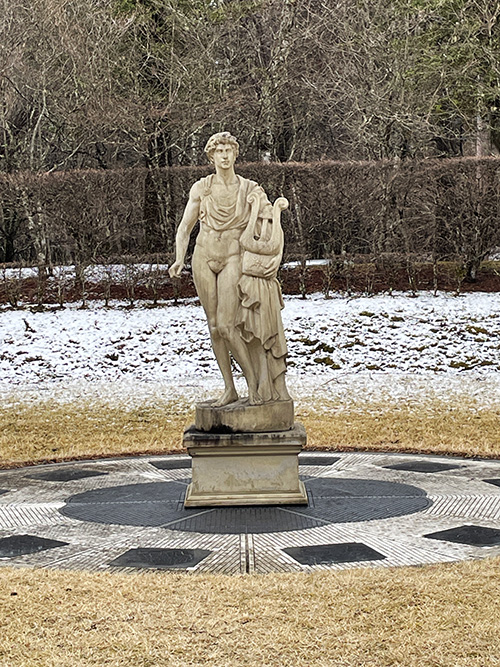
わたしは「作家と住空間」という電子出版をこの4月初めに出版します。住宅にかかわって生きてきたことのNEXT領域感。徐々にご案内をしていきたいと考えております、ぜひよろしくお願いします。
作家はその生きた時代が終わったあと、住んでいた住宅空間が「祈念碑」のように保存されたりする。きのうも友人たちとの終末期の交友心情について触れたけれど、人間各個の生死の領域のことまでを大きく深く含めた全存在として、作家という存在はわたしたちといわばこころの交友を重ねていくものだろう。
わたしが生きてきたなかで、大きな影響力を持った作家の一人として三島由紀夫がいる。
かれのあの最期の自決事件があって、現代世界での一種の「アンタッチャブル」としてあり続けている。
その住空間はいまも東京に残され保存されているけれど公開はされていない。ただし、写真家・篠山紀信の発表した住宅写真集がいまも残されていてわたしも事後に購入してきている。
そしてもう1ヵ所、その名を冠した文学館が山中湖畔にあるという情報を知っていた。
わたし自身は政治的スタンスにおいてあの当時はむしろ、真逆の新左翼運動に近しかったので、事件の衝撃は十分に受けていたけれど心情においては距離感を持っていた。けれど加齢してきて、柳田國男的「民俗」という濾過を通り過ぎて来て、徐々に三島的な心情の基底旋律にも思いが至るようになってきた。
今回、東京への移動出張機会があり少し時間にゆとりをもたせ、この山中湖畔にまで足を伸ばす機会を持てた。
三島というセンシティブな人物の文学館は全国の自治体としては取り組みにくいことが容易に想像できるなかで、この山中湖では縁があったので果敢に手を上げた経緯のようだった。もちろん一般的文学館なので「住空間」についての臨場感はあり得ないだろうと考えていた。しかし、現地に来て見て、篠山紀信の写真集で見ていた「庭の彫像」レプリカが置かれている様子に接して強く臨場感が感じられた。
正直、三島のこうした「庭への彫像設置」という感覚は写真集を見ていて違和感が強かったのだけれど、この写真のように置かれている様に接して、背景の自然の空気感もあってか三島個人の心象世界への「扉〜とびら」のように感じられた。三島由紀夫という人間と向かい合うひとつの空間的機縁。北海道人の「庭」の受け止め方、その本州人との相違を書いてきたけれど、こういう庭・彫像と「住み手」の関係性もあるのだという発見。
こうした彫像と毎日向かい合い対話しながらかれ三島由紀夫は生きていたということに、ある蓋然性を感じさせられていた。本来はノーベル文学賞を受けるべき作家であった三島由紀夫の世界。いろいろなプロセスを過ぎて、やっぱりこの人物と対話してみたいという気分が沸いてきていた。空間のパワーだろうか。
English version⬇
[Visit the Yukio Mishima Literature Museum on the shores of Lake Yamanaka.
The sense of placing a statue in the garden, which is also of Mediterranean world sensitivity. Apparently, I felt a strong persuasive force as a boundary to the literary world of the writer Mishima. …
I am publishing an e-publication early this April called ‘Writers and Housing Spaces’. The NEXT area of my life involved in housing. I will gradually be making announcements and would be grateful for your support.
After the artist’s time is over, the residential space in which he or she lived is sometimes preserved like a ‘monument of remembrance’. Yesterday I mentioned the feelings of friendship with friends at the end of life, but as a whole being that includes the realm of life and death of each individual human being, the existence of a writer is a kind of spiritual companionship with us all.
One of the most influential writers in my lifetime is Yukio Mishima.
His final suicide has remained a kind of ‘untouchability’ in the modern world.
His living space is still preserved in Tokyo, but is not open to the public. However, a collection of photographs of the house published by the photographer Kishin Shinoyama still remains, and I have purchased a copy after the fact.
I also knew that there was another museum of literature named after him on the shores of Lake Yamanaka.
In terms of my own political stance at the time, I was rather close to the New Left Movement, which was the complete opposite of the New Left Movement, so although I was fully shocked by the incident, I was emotionally distant from it. However, as I have grown older, I have passed through the filter of Yanagida Kunio’s ‘folklore’ and have gradually come to think about the underlying melody of Mishima’s sentiments.
This time, I had the opportunity to travel to Tokyo for a business trip, which gave me a little more time to spare, and I had the chance to extend my visit to the shores of Lake Yamanaka.
It was easy to imagine that it would be difficult for local authorities throughout Japan to build a museum of the sensitive figure of Mishima, but Lake Yamanakako had a connection with Mishima, so it seemed to be a bold step to take. Of course, as a general literature museum, we thought it would be impossible to have a realistic sense of ‘living space’. However, when I visited the site and saw a replica of the ‘garden statue’ that I had seen in Kishin Shinoyama’s photo collection, I felt a strong sense of realism.
To be honest, I had a strong sense of discomfort when I saw Mishima’s ‘statues in the garden’ in his photo books, but when I saw them placed as in this photo, I felt as if they were ‘doors’ to Mishima’s personal world of imagination, partly because of the natural atmosphere in the background. A spatial opportunity to confront the human being Yukio Mishima. I have written about the differences in the way I perceive the garden as a Hokkaido resident compared to people from Honshu, but I discovered that there is also this kind of relationship between the garden/statue and its ‘inhabitants’.
The fact that Yukio Mishima lived in daily dialogue with these statues made me feel a certain probability. The world of Yukio Mishima, a writer who should have won the Nobel Prize for Literature. After passing through various processes, the feeling of wanting to dialogue with this person had been aroused. Is it the power of space?
Posted on 3月 31st, 2025 by 三木 奎吾
Filed under: 住宅取材&ウラ話







コメントを投稿
「※誹謗中傷や、悪意のある書き込み、営利目的などのコメントを防ぐために、投稿された全てのコメントは一時的に保留されますのでご了承ください。」
You must be logged in to post a comment.